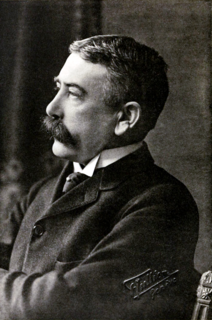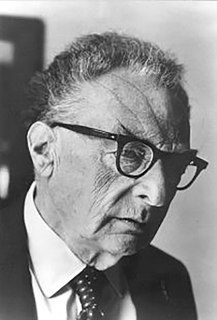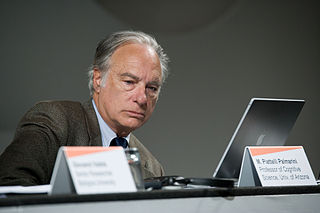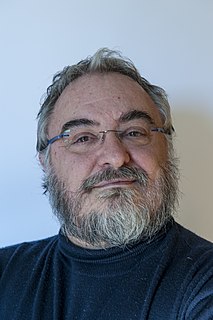
Evolutionary linguistics or Darwinian linguistics is a sociobiological approach to the study of language. Evolutionary linguists consider linguistics as a subfield of sociobiology and evolutionary psychology. The approach is also closely linked with evolutionary anthropology, cognitive linguistics and biolinguistics. Studying languages as the products of nature, it is interested in the biological origin and development of language. Evolutionary linguistics is contrasted with humanistic approaches, especially structural linguistics.

Ferdinand de Saussure was a Swiss linguist, semiotician and philosopher. His ideas laid a foundation for many significant developments in both linguistics and semiotics in the 20th century. He is widely considered one of the founders of 20th-century linguistics and one of two major founders of semiotics, or semiology, as Saussure called it.

Avram Noam Chomsky is an American linguist, philosopher, cognitive scientist, historical essayist, social critic, and political activist. Sometimes called "the father of modern linguistics", Chomsky is also a major figure in analytic philosophy and one of the founders of the field of cognitive science. He is a Laureate Professor of Linguistics at the University of Arizona and an Institute Professor Emeritus at the Massachusetts Institute of Technology (MIT), and is the author of more than 150 books on topics such as linguistics, war, politics, and mass media. Ideologically, he aligns with anarcho-syndicalism and libertarian socialism.

Roman Osipovich Jakobson was a Russian-American linguist and literary theorist.

Universal grammar (UG), in modern linguistics, is the theory of the genetic component of the language faculty, usually credited to Noam Chomsky. The basic postulate of UG is that there are innate constraints on what the grammar of a possible human language could be. When linguistic stimuli are received in the course of language acquisition, children then adopt specific syntactic rules that conform to UG. The advocates of this theory emphasize and partially rely on the poverty of the stimulus (POS) argument and the existence of some universal properties of natural human languages. However, the latter has not been firmly established, as some linguists have argued languages are so diverse that such universality is rare. It is a matter of empirical investigation to determine precisely what properties are universal and what linguistic capacities are innate.
In linguistics, transformational grammar (TG) or transformational-generative grammar (TGG) is part of the theory of generative grammar, especially of natural languages. It considers grammar to be a system of rules that generate exactly those combinations of words that form grammatical sentences in a given language and involves the use of defined operations to produce new sentences from existing ones. The method is commonly associated with American linguist Noam Chomsky.
Pirahã, or Múra-Pirahã, is the indigenous language of the isolated Pirahã people of Amazonas, Brazil. The Pirahã live along the Maici River, a tributary of the Amazon River.

Generative grammar, or generativism, is a linguistic theory that regards linguistics as the study of a hypothesised innate grammatical structure. It is a biological or biologistic modification of earlier structuralist theories of linguistics, deriving ultimately from glossematics. Generative grammar considers grammar as a system of rules that generates exactly those combinations of words that form grammatical sentences in a given language. It is a system of explicit rules that may apply repeatedly to generate an indefinite number of sentences which can be as long as one wants them to be. The difference from structural and functional models is that the object is base-generated within the verb phrase in generative grammar. This purportedly cognitive structure is thought of as being a part of a universal grammar, a syntactic structure which is caused by a genetic mutation in humans.

Syntactic Structures is an influential work in linguistics by American linguist Noam Chomsky, originally published in 1957. It is an elaboration of his teacher Zellig Harris's model of transformational generative grammar. A short monograph of about a hundred pages, Chomsky's presentation is recognized as one of the most significant studies of the 20th century. It contains the now-famous sentence "Colorless green ideas sleep furiously", which Chomsky offered as an example of a grammatically correct sentence that has no discernible meaning. Thus, Chomsky argued for the independence of syntax from semantics.

Piergiorgio Odifreddi is an Italian mathematician, logician, aficionado of the history of science, and popular science writer and essayist, especially on philosophical atheism as a member of the Italian Union of Rationalist Atheists and Agnostics. He is philosophically and politically near to Bertrand Russell and Noam Chomsky.

Daniel Leonard Everett is an American linguist and author best known for his study of the Amazon Basin's Pirahã people and their language.

In evolutionary biology, a spandrel is a phenotypic trait that is a byproduct of the evolution of some other characteristic, rather than a direct product of adaptive selection. Stephen Jay Gould and Richard Lewontin brought the term into biology in their 1979 paper "The Spandrels of San Marco and the Panglossian Paradigm: A Critique of the Adaptationist Programme". Adaptationism is a point of view that sees most organismal traits as adaptive products of natural selection. Gould and Lewontin sought to temper what they saw as adaptationist bias by promoting a more structuralist view of evolution.
Langueandparole is a theoretical linguistic dichotomy distinguished by Ferdinand de Saussure in his Course in General Linguistics.

Biolinguistics can be defined as the study of biology and the evolution of language. It is highly interdisciplinary as it is related to various fields such as biology, linguistics, psychology, anthropology, mathematics, and neurolinguistics to explain the formation of language. It is important as it seeks to yield a framework by which we can understand the fundamentals of the faculty of language. This field was first introduced by Massimo Piattelli-Palmarini, professor of Linguistics and Cognitive Science at the University of Arizona. It was first introduced in 1971, at an international meeting at the Massachusetts Institute of Technology (MIT). Biolinguistics, also called the biolinguistic enterprise or the biolinguistic approach, is believed to have its origins in Noam Chomsky's and Eric Lenneberg's work on language acquisition that began in the 1950s as a reaction to the then-dominant behaviorist paradigm. Fundamentally, biolinguistics challenges the view of human language acquisition as a behavior based on stimulus-response interactions and associations. Chomsky and Lenneberg militated against it by arguing for the innate knowledge of language. Chomsky in 1960s proposed the Language Acquisition Device (LAD) as a hypothetical tool for language acquisition that only humans are born with. Similarly, Lenneberg (1967) formulated the Critical Period Hypothesis, the main idea of which being that language acquisition is biologically constrained. These works were regarded as pioneers in the shaping of biolinguistic thought, in what was the beginning of a change in paradigm in the study of language.
The linguistics wars were a protracted academic dispute inside American theoretical linguistics which took place mostly in the 1960s and 1970s, stemming from an intellectual falling-out between Noam Chomsky and some of his early colleagues and doctoral students. The debate began in 1967, when linguists Paul Postal, "Haj" Ross, George Lakoff, and James McCawley—self-dubbed the "Four Horsemen of the Apocalypse" —proposed an approach to the relationship between syntax and semantics which treated deep structures as meanings rather than syntactic objects. While Chomsky and other generative grammarians argued that the meaning of a sentence was derived from its syntax, the generative semanticists argued that syntax was derived from meaning.

Andrea Carlo Moro is an Italian linguist, neuroscientist and novelist.
Michael C. Frank is a developmental psychologist at Stanford University who proposed that infants' language development may be thought of as a process of Bayesian inference. He has also studied the role of language in numerical cognition by comparing the performance of native Pirahã language speakers to that of MIT undergraduate students in numeric tasks. For this work, he traveled to Amazonas, Brazil with Daniel Everett, a linguist best known for his claim that Pirahã disproves a crucial component of Noam Chomsky's theory of universal grammar, recursion. Frank won the Cognitive Science Society's prestigious Marr Award for this work in 2008.

Digital infinity is a technical term in theoretical linguistics. Alternative formulations are "discrete infinity" and "the infinite use of finite means". The idea is that all human languages follow a simple logical principle, according to which a limited set of digits—irreducible atomic sound elements—are combined to produce an infinite range of potentially meaningful expressions.

Decoding Chomsky: Science and Revolutionary Politics is a 2016 book by the linguistic anthropologist Chris Knight on Noam Chomsky's approach to science and politics. Knight admires Chomsky's politics, but argues that his linguistic theories were influenced in damaging ways by his immersion since the early 1950s in an intellectual culture heavily dominated by US military priorities, an immersion deepened when he secured employment in a Pentagon-funded electronics laboratory in the Massachusetts Institute of Technology.
Theory of language is a topic from philosophy of language and theoretical linguistics. It has the goal of answering the questions "What is language?"; "Why do languages have the properties they have?"; or "What is the origin of language?".














